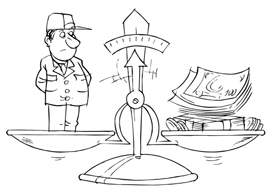
November 01, 2014

Source: Shutterstock
One of the reasons I read the liberal newspapers when I am in Britain”apart from the fact that they are the best”is that they irritate me so by their smug self-righteousness (my self-righteousness is never smug, it is justified), and I have reached an age when the ability to be irritated by something cannot be taken entirely for granted. While there’s irritation, one might almost say, there’s life; the irritated still care enough about something to get worked up about it. God preserve us from perfect equanimity.
Fortunately in last Sunday’s Observer there was plenty to irritate me”the newspaper did not let me down. Being one of those few remaining people who turn first in any publication to the book reviews, a habit of fifty years, my beady eye alighted on the following in a review of a book about Mecca:
In the history of religion, and in the wider story of mankind’s yearning to understand its place in the universe, Mecca is almost as important a site as Jerusalem, yet in English it is still virtually unwritten.
Now why is that, I wondered, and I read on seeking enlightenment. Perhaps other languages”French, German, or Spanish, for example”are better supplied, the English-speaking world being so parochial. No real answer was forthcoming, though we were told of the
destruction wrought on Mecca since the 1950s when the Saudis’ bad taste, hatred of history and megalomania…allowed them to recreate Mecca as a sort of Arabian Nights version of Disneyland, a Muslim Las Vegas.
That must be it, then; the reason there are no books in English about Mecca is that the city is not worth visiting anymore.
I turned to another review:
The right and far right have Nigel Farage… “Get out of the European Union.” Get out, and with one convulsive act of renunciation, you can escape the complexity that blights your lives.
Now this is a willful or lazy misrepresentation of Farage. It is true that his best-known policy prescription is the withdrawal of Britain from Europe, but he has never suggested that it is the panacea to Britain’s woes. What he has said is that withdrawal from the European Union is a necessary condition of Britain solving its problems, which is very different from, and much less stupid than, what the reviewer claims he thinks. Mr. Farage might or might not be right (personally, I think Britain’s main problem is the cultural level of the people, which I would place considerably lower than that of the Congolese), but putting so stupid an idea in his mouth absolves the writer from the painful necessity of having to counter his actual arguments”painful, I suspect, because he intuits that some of them may be right.
While I am on the subject of simple ideas, I found a truly simple one in the economics and business section of the paper. The headline read, “Productivity puzzle solved: just give the lowest-paid a big rise.” I loved the article: We all love evident foolishness.
British workers have the lowest productivity of workers in any major economy. If nothing changes, more people would have to work longer hours to increase national output. The low productivity may be due to low investment, or to the quality of the workers themselves, or to some combination of the two.
Now the author of the article refers to two companies that found that productivity increased if they raised the wages of their lowest paid workers from the minimum wage to about 130 per cent of the minimum wage. Therefore, according to the writer, all that is necessary to increase productivity in general is increase wages of all lower paid workers: “Raise pay and watch productivity follow.”